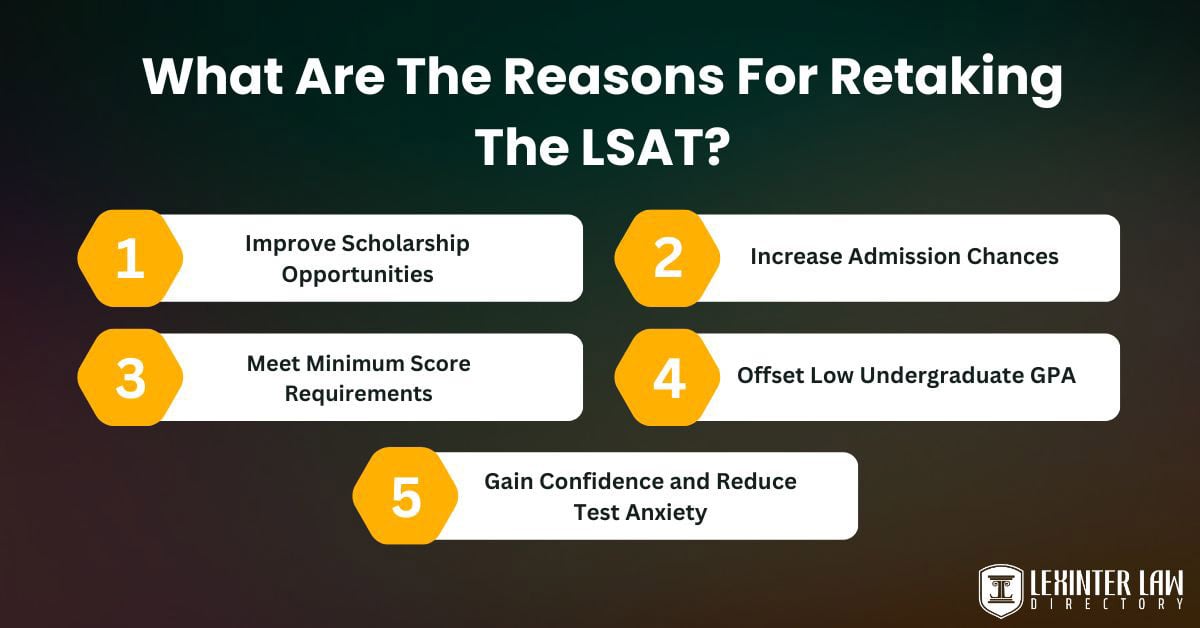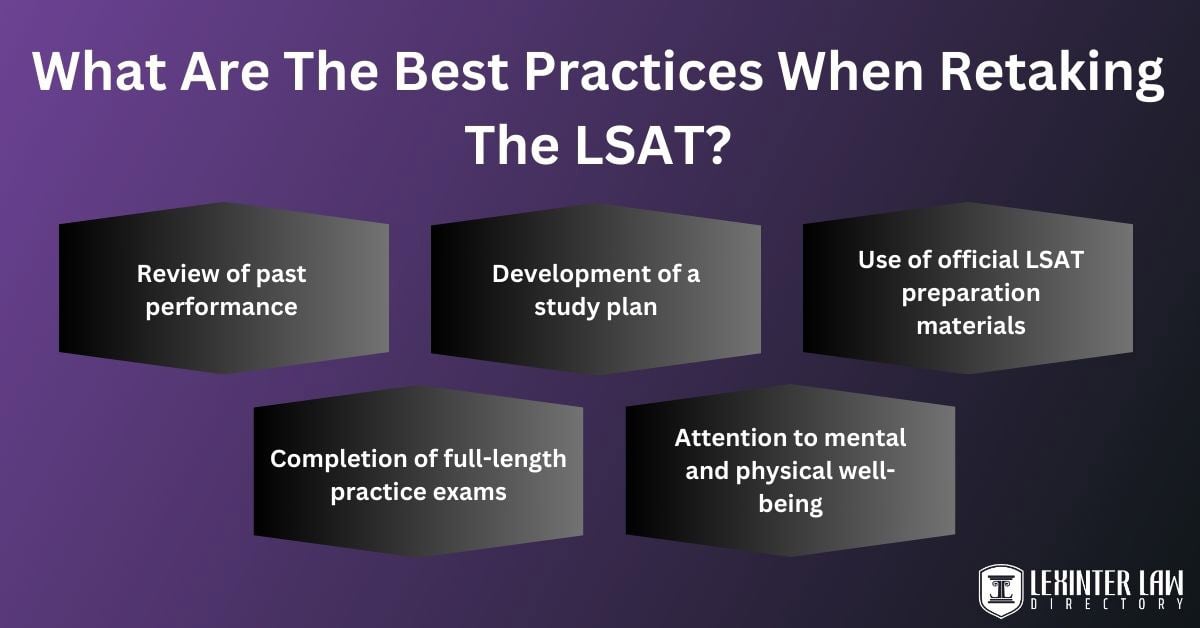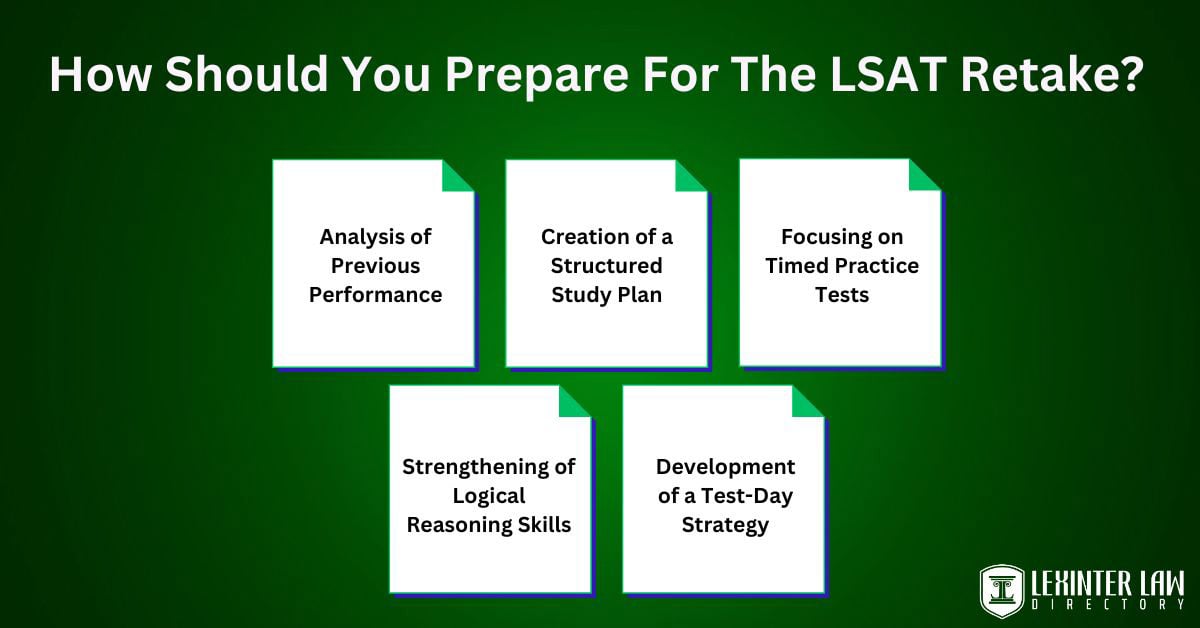How Many Times Can You Take The LSAT? Reasons For Retaking LSAT
You can take the LSAT up to five times within the current reportable score period and seven times in a lifetime. Students inquiring, “how many times can I take the LSAT” must know the limits. The limits include any canceled scores but exclude absences or withdrawals. A perfect score of 180 restricts further attempts within five years. LSAT-Flex tests from May to August 2020 do not count due to COVID-19. Law schools consider the highest score, but multiple attempts affect their view on preparation and consistency. Appeals for exemptions require detailed explanations and supporting documentation. Aspiring students retake the LSAT for several key reasons. Enhancing scholarship opportunities is the first reason, as higher scores lead to better financial aid packages, reducing the financial burden of law school education and minimizing student loan debt. Increasing admission chances is the second reason, with higher scores making applications more competitive and securing spots in higher-ranked schools. The third reason involves meeting minimum score requirements set by specific law schools and ensuring application consideration. The fourth reason is to offset a low undergraduate GPA; a high LSAT score balances a less impressive GPA and strengthens the overall application. Gaining confidence and reducing test anxiety is crucial, as familiarity with the test structure and repeated practice lead to better performance and a more relaxed testing experience. LSAT scores remain valid for five years, answering the question of how long is LSAT score valid. The period gives students ample time to apply to law schools after taking the test. Retaking the LSAT within the validity period benefits individuals seeking a higher score to enhance their application. Staying organized with application materials and deadlines is crucial for a successful law school application process. LSAC provides detailed score reports for each LSAT retake test taken within the last five years, helping candidates and law schools understand performance trends.
Table of Contents
How Many Times Can You Take The LSAT?
You can take the LSAT a maximum of five times within the current reportable score period. There is a lifetime limit of seven attempts. An example is a student taking the LSAT in June 2024, and that test counts toward the five attempts allowed from June 2024 to June 2029. Reaching the five-attempt limit means waiting for an older score to expire. The limits include any canceled scores but do not count absences or withdrawals.
Achieving a perfect score of 180 restricts students from retaking the LSAT within the current five-year reporting period. LSAT-Flex tests administered between May and August 2020 do not count toward the limits during the COVID-19 pandemic. Strategic planning of LSAT attempts is crucial, given the restrictions.
Law schools consider only the highest score, but having several attempts influences their view of consistency and preparation. LSAC allows appeals for exemptions to the limits if significant and extenuating circumstances exist. An appeal requires a detailed explanation and supporting documentation. Planning the LSAT attempts with the limits in mind is essential for optimizing the law school application. Students must consider each attempt carefully and prepare thoroughly to maximize their performance. Law schools see all the LSAT scores, and consistent improvement reflects positively on the application. Frequent retakes, however, without significant score improvements raise concerns about readiness. Students must take advantage of the available resources to ensure each attempt counts. Understanding the limits and the potential impact on law school admission test scores helps strategize the test-taking approach effectively.
What Are The Reasons For Retaking The LSAT?

The five reasons for retaking the LSAT are listed below.
- Improve Scholarship Opportunities: Aspiring students must retake the LSAT to enhance scholarship opportunities. Higher scores lead to better financial aid packages. Law schools reward top-scoring applicants with substantial scholarships. Scholarships reduce the financial burden of law school education. Retaking the test results in higher scores increases eligibility for merit-based aid. Scholarships mean less student loan debt, and graduating with minimal debt allows greater career flexibility. The financial advantage significantly impacts long-term financial stability.
- Increase Admission Chances: Aspiring lawyers must consider retaking the LSAT to increase admission chances. Higher scores make applications more competitive, and top law schools prioritize applicants with exceptional LSAT results. A better score outweighs weaker GPA components. Admissions committees value improvement and dedication, as shown by retaking and higher scores, which reflect strong analytical and logical skills. Retaking the LSAT demonstrates a commitment to legal education.
- Meet Minimum Score Requirements: Aspiring students need to meet minimum score requirements for specific law schools. Several law programs set strict LSAT score thresholds for admission, and failing to meet the scores results in rejection. Retaking the LSAT provides a second chance to meet the criteria. Meeting minimum scores opens doors to preferred programs.
- Offset Low Undergraduate GPA: Aspiring lawyers with low undergraduate GPAs must retake the LSAT to offset academic records. A high LSAT score balances a less impressive GPA. Law schools evaluate the GPA and LSAT scores holistically. Retaking the LSAT and scoring higher improves overall application strength. A high LSAT score demonstrates academic potential and dedication to prospective schools.
- Gain Confidence and Reduce Test Anxiety: Aspiring students retake the LSAT to gain confidence and reduce test anxiety. Familiarity with test structure and format increases with each attempt. Repeated practice leads to better time management during the exam. Confidence boosts performance, leading to higher scores. Reducing test anxiety allows clearer thinking and better focus, and improved scores result from a more relaxed testing experience.
What Is The LSAT Limit For Retaking Each Year?
The LSAT limit for retaking each year is five times in a single testing year. Individuals take the LSAT up to five times within the current and past five testing years. The LSAC allows a total of seven attempts over a lifetime. Tests taken before September 2019 and during the LSAT-Flex period (May to August 2020) do not count towards the limits. The LSAT retake limits exist to maintain the exam’s integrity and fairness. Allowing unlimited retakes leads to score inflation and reduces the test’s reliability. A restricted number of attempts ensures each score reflects the test taker’s true ability. The limit prevents excessive test preparation, unfairly benefiting individuals with more resources. LSAC aims to create an equitable testing environment for all applicants. Canceled scores count towards the limit to discourage strategic score cancellations. The policy reduces the administrative burden on the LSAC and helps manage testing resources effectively.
Candidates are allowed to retake the LSAT up to five times within the same year. An example is if a student takes the LSAT between July 1, 2024, and June 30, 2025, it counts as part of that testing year. The period determines the five-time limit for retaking the LSAT within a single testing year. The limits apply to all test takers, regardless of their circumstances. Students needing to retake the LSAT due to exceptional circumstances must apply for an exemption. The process involves submitting a detailed explanation and relevant documentation to the Law School Admission Council (LSAC) for consideration. The appeal must be submitted at least five business days before the registration deadline for the desired test date. The retake policy ensures fairness and prevents excessive attempts from skewing the admissions process. Law schools receive a more accurate assessment of candidates’ abilities when scores reflect genuine improvement rather than repeated attempts. Limiting the number of retakes helps maintain the integrity of the LSAT as a standardized test.
Does Retaking The LSAT Have An Impact On Law School Admission Predictor?
Yes, retaking the LSAT has an impact on the Law School Admission Predictor. The Law School Admission Predictor (LSAP) estimates an applicant’s chances of getting accepted into various law schools. The predictor generates predictions using key metrics like the Law School Admission Test (LSAT) score and undergraduate GPA. The tool helps applicants identify schools within their reach, target options, and safety choices. Retaking the LSAT significantly impacts the LSAP’s results. An improved LSAT score enhances admission chances because many law schools prioritize LSAT scores as a critical factor in admissions decisions. The prioritization occurs because the LSAT measures skills essential for success in the first year of law school, such as reading comprehension, analytical reasoning, and logical reasoning.
The LSAP leverages historical data to predict outcomes, factoring in applicants’ highest LSAT scores. Tools, including the 7Sage Law School Predictor and LSATMax’s predictor, rely on a combination of LSAT scores and GPAs to generate probabilities of admission. The predictions provide a statistical estimate rather than a guaranteed outcome, acknowledging the holistic review process that includes personal statements, recommendation letters, and extracurricular activities. Retaking the LSAT and achieving a higher score significantly impact the outcomes of the law school admission predictor. The improvement underscores the importance of LSAT scores in law school admissions and the benefits of perseverance and strategic preparation. Higher LSAT scores enhance predicted acceptance probabilities, helping applicants target more competitive law schools and ultimately strengthening their overall applications.
What Are The Best Practices When Retaking The LSAT?

The five best practices for retaking the LSAT are listed below.
- Review of past performance: Reviewing previous performance helps identify strengths and weaknesses. Students must request the LSAT score report, which provides detailed insights into each section. Analyzing the report helps in understanding which areas require improvement. Focusing on weak areas leads to a better overall score. Several test prep companies offer services to analyze LSAT score reports and help students devise effective study plans. Kaplan provides detailed Smart Reports after students complete full-length diagnostic tests. The reports outline areas of strength and weakness, allowing students to focus their studies on the most critical areas.
- Development of a study plan: Creating a structured study schedule ensures consistent preparation. Students must allocate specific times each week to study different sections of the LSAT. Consistency helps retain information and improves understanding. Study schedules must include regular breaks to avoid burnout. A planner or digital calendar helps track progress and ensure all topics are covered.
- Use of official LSAT preparation materials: Students must utilize official LSAT preparation resources for effective studying. The LSAC provides access to real LSAT questions through its Official LSAT Prep Plus program. The materials help students familiarize themselves with the test format and question types. Regular practice with the resources builds confidence and improves accuracy. Students who use official prep materials achieve higher scores, according to LSAC. Consistent practice with authentic questions is crucial for success.
- Completion of full-length practice exams: Taking full-length practice tests under timed conditions simulates the actual test day experience. The practice helps students build stamina and manage time effectively. Simulating test conditions reduces anxiety and helps identify areas that need more focus. Test prep companies offer timed practice tests, a valuable part of the preparation strategy. LSAC’s LawHub provides official LSAT PrepTests with simulated exam modes and instant feedback. LSAC collaborates with Khan Academy to offer free, personalized LSAT prep. Other notable prep companies include Magoosh, which offers affordable self-paced courses with official LSAT questions and video explanations.
- Attention to mental and physical well-being: Maintaining good mental and physical health is vital during your LSAT preparation. Students must ensure they get adequate sleep, eat nutritious meals, and exercise regularly to keep their minds and bodies in peak condition. Incorporating relaxation techniques, such as meditation or deep-breathing exercises, helps manage stress. A healthy lifestyle enhances cognitive function and concentration, making study sessions more productive. Taking care of well-being ensures students are at their best during preparation and test day.
How Should You Prepare For The LSAT Retake?

The five ways you should prepare for the LSAT retake are listed below.
- Analysis of Previous Performance: Students need to review their previous LSAT performance thoroughly. Candidates must identify specific sections and question types where mistakes occurred. Students must use the official score report to pinpoint weaknesses. The analysis provides a clear direction for targeted study. Tracking progress over time helps ensure improvement in specific areas.
- Creation of a Structured Study Plan: Students must develop a detailed and structured study plan. Candidates must allocate time for each LSAT section, ensuring a balanced approach. Students must include specific goals for each study session and incorporate a mix of practice tests, drills, and review sessions. A well-organized plan for retaking the LSAT ensures comprehensive coverage of all test areas.
- Focusing on Timed Practice Tests: Students must take several timed practice tests under realistic conditions. Simulate actual test-day scenarios to build stamina and familiarity. Analyze performance on each practice test to identify patterns. Practicing with a timer helps improve speed and accuracy. Students must focus on pacing strategies to ensure the completion of each section. Consistent practice under timed conditions leads to better test-day performance.
- Strengthening of Logical Reasoning Skills: Students must dedicate significant time to improving logical reasoning skills. Candidates need to practice identifying argument structures and common logical fallacies. Aspiring lawyers need to use official LSAT logical reasoning questions for practice. Students must focus on understanding why an answer is correct rather than memorizing it. Students must incorporate logic games and puzzles into study sessions. Aspiring lawyers must prepare for LSAT by focusing on logical reasoning. Consistent practice enhances critical thinking and reasoning abilities.
- Development of a Test-Day Strategy: Students need a well-defined test-day strategy. Aspiring lawyers must plan to arrive at the test center early, ensuring a stress-free start. Students must bring necessary materials, including identification and permitted supplies. Practice relaxation techniques to manage test-day anxiety. Allocate time wisely for each section, adhering to the plan developed during practice tests. Staying focused and calm throughout the exam ensures optimal performance on the retake.
Will Your Score Improve If You Retake The LSAT?
Yes, your score will improve if you retake the LSAT, but the extent varies among individuals. Test-takers who retake the LSAT see an increase of about 2 to 3 points on their second attempt on average, but the improvement is not guaranteed. Some test takers’ scores do not change, and some even experience a decrease. The majority of test takers increase their score on the second test. Improvement depends on the effectiveness of new study strategies and the ability to address previous weaknesses. Reassessing and adapting study strategies increases the chances of achieving a higher score. Focusing on weaknesses and utilizing tailored practice exams that emphasize challenging sections is beneficial. Engaging in consistent and intentional LSAT practice helps understand the reasoning behind mistakes. Professional tutors or structured prep courses provide targeted assistance, potentially leading to significant score improvements. Taking a short break before resuming intense study sessions helps reset the mind and improve focus. The LSAT is a critical component of law school applications, and a higher score significantly impacts admission prospects. The decision to retake the LSAT, therefore, must be made after careful consideration of potential improvements and the resources available for preparation. Candidates must remain mindful of the balance between additional preparation and the overall strength of their application.
How Do Law Schools Manage Multiple LSAT Scores?
Law schools manage multiple LSAT scores by focusing on the highest score received. The American Bar Association (ABA) requires law schools to report the highest LSAT score of each matriculating student, directly influencing their rankings in the U.S. News and World Report. Law schools prioritize applicants’ highest scores over their average scores. Several law schools, including prominent ones such as Harvard and the University of Texas at Austin, consider the highest LSAT score as the most critical factor in their admissions decisions. The approach aligns with their reporting requirements and ranking strategies. Prestigious law schools, particularly institutions in the top 14 (T14) law schools, review all LSAT scores as part of a holistic evaluation process. Yale and Columbia, for example, consider the entire testing history but still place significant weight on the highest score. Applicants must provide detailed explanations if there are large discrepancies between their LSAT scores. Schools like Stanford and the University of Chicago appreciate understanding any factors contributing to significant changes in scores. Understanding how different law schools manage multiple LSAT scores is crucial for applicants aiming to optimize their chances of admission. The highest LSAT score is usually the most crucial factor for admissions, but applicants must check individual law school policies. Providing explanations for any significant score discrepancies strengthens applications. The approach ensures optimal performance on the retake and helps applicants present the best case to admissions committees.
How Long Is The LSAT Score Valid?
LSAT score is valid for five years. The period allows students ample time to apply to law schools after taking the test. The five-year validity means that if a candidate took the LSAT in June 2020, the score remains valid until June 2025. Law schools only consider the highest score when evaluating applicants, but several schools, however, review all scores from the past five years. Law schools need to assess candidates based on their current abilities, as the LSAT measures critical skills necessary for success in law school. An LSAT score after five years no longer accurately reflects a candidate’s abilities due to potential changes in skills and knowledge. A recent LSAT score better represents an applicant’s current analytical and logical reasoning skills. Law schools want to ensure incoming students are prepared for their rigorous coursework. Retaking the LSAT within five years is beneficial if a candidate believes a higher score is attainable. An improved score within the five-year window enhances an application, showing growth and improvement.
Candidates must consider the preparation time and effort required to achieve a higher score. Candidates must keep track of their LSAT score’s expiration date to ensure they meet application deadlines. Planning ahead helps avoid the need to retake the LSAT unexpectedly. Staying organized with application materials and deadlines is crucial for a successful law school application process. LSAC, the organization that administers the LSAT, provides detailed score reports for each test taken within the last five years. The reports help candidates and law schools understand performance trends. Reviewing the reports guides candidates in preparing for a potential retake. The LSAT score validity period aligns with the dynamic nature of law school admissions. The period allows candidates to plan their applications strategically while ensuring that law schools evaluate up-to-date skills. Maintaining awareness of the LSAT score’s expiration helps candidates stay on track and maximize their opportunities in the law school admissions process.
What To Do Next If You Are Satisfied With Your LSAT Score?
You must follow specific steps next to maximize the chances of getting into the preferred law school if you are satisfied with your LSAT score. The first step involves researching potential law schools. Candidates must focus on schools that align with their career goals, location preferences, and financial situation. Checking each school’s average LSAT scores, acceptance rates, and Bar passage rates provides valuable insights.
Gathering application materials becomes crucial after selecting potential law schools. Required materials generally include transcripts, letters of recommendation, personal statements, and a resume. Each document must reflect the candidate’s strengths, experiences, and dedication to a legal career. Personal statements, in particular, must be tailored to highlight why the candidate is a good fit for the specific law school. Timing is another critical factor. Applying early in the admissions cycle significantly enhances acceptance chances. Several prestigious law schools operate on a rolling admissions basis, meaning they review applications as they arrive and make decisions throughout the admissions period. Applying early has a better chance of admission before most spots get filled.
Students must consider visiting the campuses of their top-choice schools. Campus visits provide a direct look at the law school’s facilities, culture, and community. Engaging with current students and faculty during the visits offers valuable perspectives and helps confirm if the school is the right fit. Another essential step involves preparing for financial aid and scholarships. Researching and applying for scholarships substantially reduces the financial burden of law school. Law schools offer merit-based scholarships, which consider LSAT scores and undergraduate GPA. Students must complete the Free Application for Federal Student Aid (FAFSA) to qualify for federal loans and grants. Networking with alumni and professionals in the legal field benefits candidates. Building relationships with individuals who have navigated the law school journey provides invaluable insights and advice. The connections assist in securing internships and job placements later in the law school experience. Staying informed about deadlines and application requirements ensures a smooth application process. Tracking each school’s deadlines for applications, financial aid, and scholarships prevents last-minute stress and errors.
Should You Retake The LSAT If You Already Have A Good LSAT Percentage?
No, you generally should not retake the LSAT if you already have a good LSAT percentage. Current LSAT scores close to or above the median score of the schools applied to make retaking unnecessary. A score of 170 or above generally aligns with the median scores of top law schools. A high score signifies strong aptitude and proficiency in the skills assessed by the test. The accomplishment demonstrates the ability to handle the rigorous demands of law school. LSAT scores in the 90th percentile or above demonstrate strong aptitude and competitiveness, meeting or exceeding many law programs’ requirements. Retaking the exam with a good LSAT percentile does not enhance the application. Admissions committees at most law schools place significant weight on LSAT scores during the evaluation process. A strong score meets or exceeds the requirements of several reputable law schools, making retaking the test unnecessary.
Retaking the LSAT introduces unnecessary stress and financial burden. Each attempt requires extensive preparation time and additional fees. The time and money are better spent on other important aspects of the law school application process, such as drafting personal statements, obtaining recommendation letters, and preparing for interviews. Another consideration is the law school’s policy on multiple LSAT scores. Several institutions consider the highest score, but some average multiple scores or view all attempts. Multiple test scores raise questions about consistency and test-taking ability, potentially creating a less favorable impression. An existing strong score presents a solid, singular achievement without complications. Focusing on other parts of the application is more beneficial. Law schools evaluate applicants holistically, looking at academic records, personal statements, letters of recommendation, and extracurricular activities. The components provide a comprehensive view of the candidate’s potential and readiness for law school. A strong LSAT score already enhances the application, allowing candidates to concentrate on strengthening the other areas.

